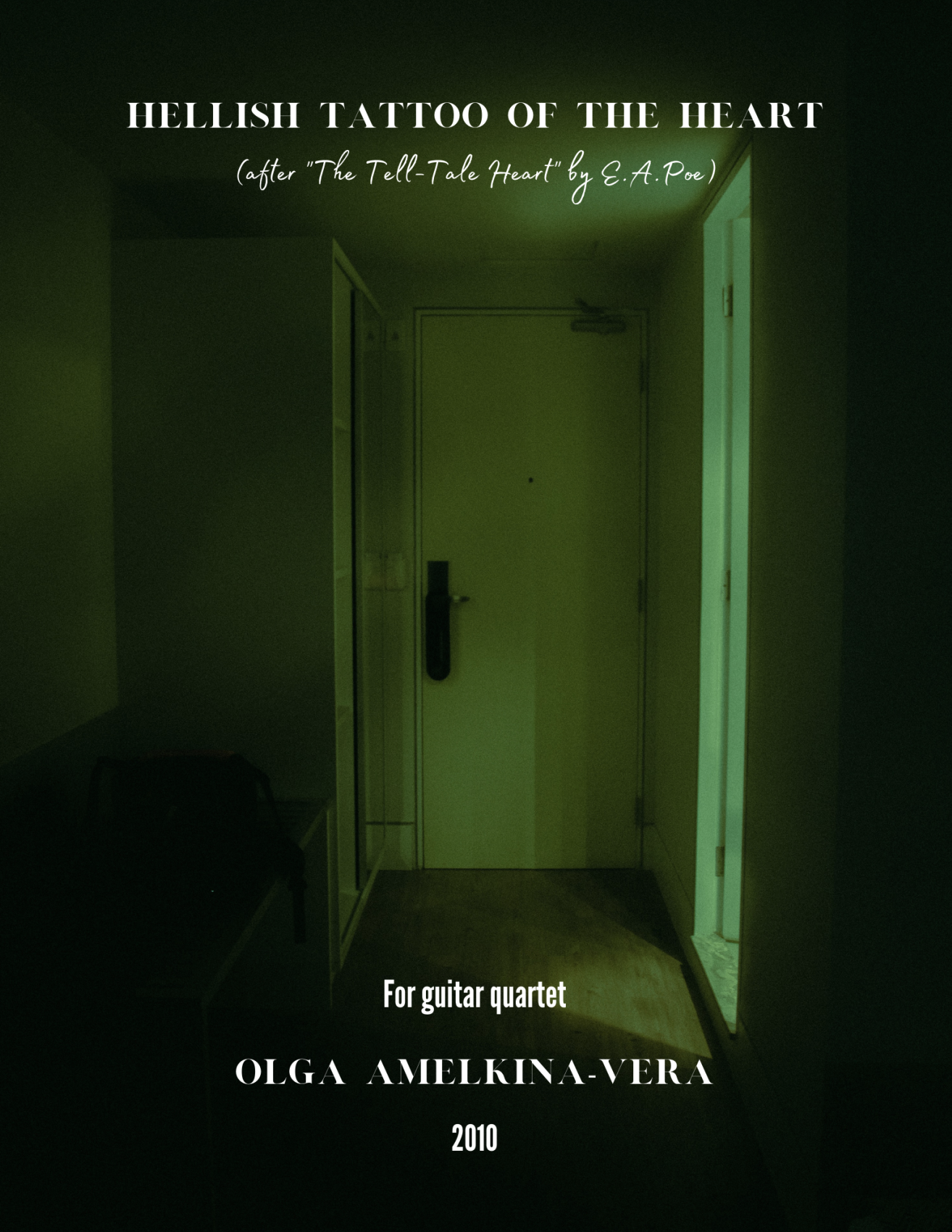 Image 1 of
Image 1 of


Hellish Tattoo of the Heart (after E.A. Poe) for guitar quartet / ensemble (2009)
Recorded by Presti (Olga Amelkina-Vera, Lynn McGrath, and Valerie Hartzell) with guest Fernand Vera on their eponymous debut CD. In the liner notes to the CD, Jonathan Leathwood writes: “Hellish Tattoo of the Heart takes its title from Edgar Allen Poe’s 1843 story, The Tell-Tale Heart, in which a murderer narrates his own crime. It is fundamentally a story about hearing: as he begins his tale, the murderer tells us that in his nervous condition, “above all was the sense of hearing acute.” Waiting in the dark to commit murder, he seems to hear his victim’s heart beating: “Meantime the hellish tattoo of the heart increased. It grew quicker and quicker, and louder and louder every instant.” Afterward he hides the body under the floorboards, but when the police come to search the premises the heartbeat seems to reverberate everywhere.
Amelkina-Vera explores the story’s macabre sound-image in a short piece that uses very few conventionally played notes—her approach was inspired in part by the sounds of John Cage’s Sonatas and Interludes for prepared piano, and recordings of noise-rock band The Jesus Lizard. The opening heartbeat rhythm is muffled, and as the piece becomes ever louder and more frantic, every sound is either stifled or immediately muted. The piece features especially the sound of the left hand tapping on the string (first heard around ten seconds into the track). Guitarists know that fretting the string too percussively creates an unwanted high pitch as the string vibrates between the finger and the nut. In conventional music one takes great pains to mask this sound; Hellish Tattoo of the Heart, by contrast, exaggerates all of these techniques evoke the confounding of audible and inaudible that is at the core of Poe’s story.”— Jonathan Leathwood
Recorded by Presti (Olga Amelkina-Vera, Lynn McGrath, and Valerie Hartzell) with guest Fernand Vera on their eponymous debut CD. In the liner notes to the CD, Jonathan Leathwood writes: “Hellish Tattoo of the Heart takes its title from Edgar Allen Poe’s 1843 story, The Tell-Tale Heart, in which a murderer narrates his own crime. It is fundamentally a story about hearing: as he begins his tale, the murderer tells us that in his nervous condition, “above all was the sense of hearing acute.” Waiting in the dark to commit murder, he seems to hear his victim’s heart beating: “Meantime the hellish tattoo of the heart increased. It grew quicker and quicker, and louder and louder every instant.” Afterward he hides the body under the floorboards, but when the police come to search the premises the heartbeat seems to reverberate everywhere.
Amelkina-Vera explores the story’s macabre sound-image in a short piece that uses very few conventionally played notes—her approach was inspired in part by the sounds of John Cage’s Sonatas and Interludes for prepared piano, and recordings of noise-rock band The Jesus Lizard. The opening heartbeat rhythm is muffled, and as the piece becomes ever louder and more frantic, every sound is either stifled or immediately muted. The piece features especially the sound of the left hand tapping on the string (first heard around ten seconds into the track). Guitarists know that fretting the string too percussively creates an unwanted high pitch as the string vibrates between the finger and the nut. In conventional music one takes great pains to mask this sound; Hellish Tattoo of the Heart, by contrast, exaggerates all of these techniques evoke the confounding of audible and inaudible that is at the core of Poe’s story.”— Jonathan Leathwood
Recorded by Presti (Olga Amelkina-Vera, Lynn McGrath, and Valerie Hartzell) with guest Fernand Vera on their eponymous debut CD. In the liner notes to the CD, Jonathan Leathwood writes: “Hellish Tattoo of the Heart takes its title from Edgar Allen Poe’s 1843 story, The Tell-Tale Heart, in which a murderer narrates his own crime. It is fundamentally a story about hearing: as he begins his tale, the murderer tells us that in his nervous condition, “above all was the sense of hearing acute.” Waiting in the dark to commit murder, he seems to hear his victim’s heart beating: “Meantime the hellish tattoo of the heart increased. It grew quicker and quicker, and louder and louder every instant.” Afterward he hides the body under the floorboards, but when the police come to search the premises the heartbeat seems to reverberate everywhere.
Amelkina-Vera explores the story’s macabre sound-image in a short piece that uses very few conventionally played notes—her approach was inspired in part by the sounds of John Cage’s Sonatas and Interludes for prepared piano, and recordings of noise-rock band The Jesus Lizard. The opening heartbeat rhythm is muffled, and as the piece becomes ever louder and more frantic, every sound is either stifled or immediately muted. The piece features especially the sound of the left hand tapping on the string (first heard around ten seconds into the track). Guitarists know that fretting the string too percussively creates an unwanted high pitch as the string vibrates between the finger and the nut. In conventional music one takes great pains to mask this sound; Hellish Tattoo of the Heart, by contrast, exaggerates all of these techniques evoke the confounding of audible and inaudible that is at the core of Poe’s story.”— Jonathan Leathwood